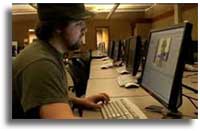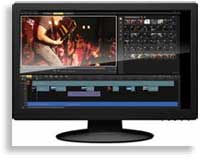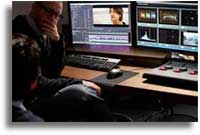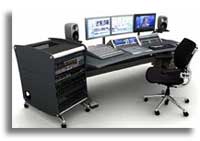VIDEO EDITING
Career in Video Editing
Video Editing serves an interesting career for creative people in the media and entertainment industry. The entire process of making art, aesthetic in the visual media, lies in the technique of editing. Video editing is the process of mainly re-arranging or modifying segments of video from one or more video tapes to form a refined and final piece of video. Video editing plays a key role in the post production process. The main task of the video editor is to edit soundtracks, film and video for the motion picture, cable and broadcast visual media industries. It is the video editors skill that determines the quality and delivery of the final product.
Video Editing is classified as Linear Editing (Tape to tape), and Non-linear editing or Digital Video Editing. Digital video editing uses computer technology to enable the editing process onscreen. Linear editing involves copying just the required portions of a film from one tape to another. Any changes or additions needed could be made only by copying the edited content onto another tape, causing undesirable degradation of images. In Non- linear editing, video and audio data are first captured to hard disks or any other digital storage device and then edited on the computer using any of the wide range of software's available for editing.
The data here can be edited and even most of the subsequent changes made without duplicating the actual film data. It is quicker, less expensive, and more flexible and saves time and money when compared to the traditional way of editing. Due to all these features and the introduction of new technologies in digital video editing, it is fast replacing the traditional or linear editing.
Nature of work and Job Description

Video editing is one of the process in which segments of videos are modified or rearranged from many video tapes for forming the advanced and final video. In post production process, video editing plays very important role. The task of video shooting is to edit film, soundtrack and video for the motioning the picture, cable and the broadcasting the media industries. Skill of video editor decides the quality and delivery of product.
Eligibility & Course Details

The candidates are prepared through most of the systematic training, to handle the ever-changing tools used within the process of video editing. They are trained to work with professional grade linear and non-linear editing equipment. Theoretical instructions which are made for practical exercises and the post-production work of television programmes have been designed to impart knowledge and skills adequate measure. The basics of video editing remains unchanged no matter which equipment is used.Video editors mainly acquire their skills through on-the-job training or formal training at various institutes. However, experience is the best training in this field. In addition, they must be able to demonstrate their skill with appropriate editing software packages.
Digital video editing uses video editing software's from very basic applications such as Windows Movie Maker to professional packages such as Final Cut Pro, ULead MediaStudio, Avid's Media Composer, Xpress Pro, Adobe Premiere etc. Good editing software is very much expensive and often requires a high-priced computer to run effectively. Editing software controls the capturing (recording) of the footage, provides a way to edit the footage, and allows the finished product to be output to a recording device.
Personal skills
Video editor has to have a high level of self-motivation, commitment and dedication to work. Creativity is the main factor for the success of a video editor. They need to have a keen eye for detail, a critical mind, the ability to listen to others and to work well as part of a team. Imagination and technical skills are essential. General computer literacy and an aptitude for working with digital equipment to achieve results are also important. They should also have a general knowledge of cameras and digital camera technology. The video editors must always be alert and updated with their skills, as new and advanced technologies as invented day by day.
Job Prospects & Career Options
A college degree is not necessary for getting a job in the field of video editing. But a degree or diploma in visual arts/ fine arts, multimedia/ information technology, media studies etc. can increases the chance of getting a reputed job. One can enter into the field of video editing, after completing the digital video editing course or a media arts degree.Video Editors work with the production personnel using advanced editing tools to analyze, evaluate, trim, arrange and join scenes according to guidelines set out by the producer or director of the project.In fact, video editors are the ones who decides what to stay and goes in terms of the content of the finished video.

Varied career opportunities are arise for the video editors and one can find job placement in film and TV production studios, web design companies, advertising and multimedia companies. They can work with independent production companies and for motion picture studios. Majority of video editors are employed on a freelance basis, working on short-term contracts for post-production studios, television companies and corporate employers. Even though varied job opportunities are arise in this field, one can use creative job seeking methods such as sending your skills-based CV to every production company and post-production house possible. Also make and maintain a good workingrelationships with people in this industry.
Remunerations
With the advent of streaming videos and movie clips in the websites, video editors are in great demand. They can work as an employer or as a freelance in a firm. The beginners in the initial stage can earn between Rs. 5,000 to Rs. 7,500 per month. The earnings can be raised after a few years of experience. Those working as freelance will be paid per hour and the amount paid will depends up on the company. Those with talent and experience will be in greatest demand and will have the best chances for employment. Large studios will be offering competitive salaries for the top editors in the field.
Success Stories

"The course I took was perfect for the sort of job I am currently doing. The three main parts of my job are Graphics for TVCs, Graphics for Music Video and DVD Authoring. All these three aspects were very well incorporated in the MDS course through the Assignments and Summatives. Secondly the software like After Effects and Adobe Encore which MDS teaches are most commonly used in NZ, so it was very easy to get used to the system of the workplace." Memories of MDS for Hitesh involve the strong emphasis that is placed on teamwork. "I remembered when we had to do our first editing assignment, we were divided into groups of three and we were given a topic on which we had to create a short story and edit it. None of the students knew each other, so it was a good experience working in a team and working with different people."
Working as a Post Production Designer for Auckland production house Zoomslide is giving Hitesh a solid workout in the dynamics of a Visual Effects career. MDS also played a key role in Hitesh finding his feet quickly in the Auckland Motion Graphics industry. "The best thing about my current job is I am getting maximum exposure in the areas of pre production, production and post production. Motion graphics is my main area but I am also getting to know other areas of making a final TVCs or Music Video, i.e. pre Production and Production. When my employer went to MDS in search for a graduated motion Graphics Artist, the Tutor at MDS showed my employer all the students' work and helped her in choosing the appropriate students for her company. Then I got a call from that company and here I am now. So I think MDS works well as a connecting link between employers and graduates."
Institutes
Video Editing |
Courses
Digital video editing makes use of video editing software's from very basic applications such as Windows Movie Maker to professional packages such as Final Cut Pro, MediaStudio, Avid's Media Composer, Xpress Pro, Adobe Premiere etc. Good editing software is expensive and often requires a high-priced computer to run effectively. Editing software controls the capturing (recording) of the footage, provides a way to edit the footage, and allows the finished product to be output to a recording device.
